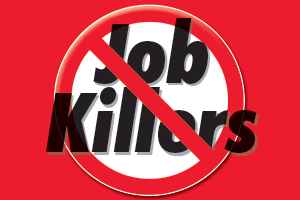SACRAMENTO, CA — The California Chamber of Commerce today released the list of new employment laws scheduled to take effect in 2017 or earlier that will have an impact on businesses in California.
Employers need to be aware of significant changes in key areas, such as the state minimum wage. Other new laws make small changes to different parts of existing list or may relate only to specific industries.
Unless specified, all new legislation goes into effect on January 1, 2017. This year, many bills feature delayed or phased-in implementation.
The summaries below appear in a CalChamber white paper, available to download here.
Wage and Hour
Several new California laws will affect employers’ wage-and-hour obligations in 2017.
Minimum Wage
SB 3 will increase the minimum wage over the next several years to $15 an hour. For January 1, 2017, businesses with 26 or more employees must pay a minimum wage of $10.50 per hour.
The minimum wage increase will require all employers to post a new Minimum Wage Order (MW-2017).
The upcoming minimum wage increase also will have an effect on other pay practices, such as the overtime rate.
Agricultural Overtime
AB 1066 will phase in increased overtime requirements for agricultural employees over the course of four years beginning January 1, 2019. Currently, agricultural employees are exempt from certain wage requirements.
Itemized Wage Statements
AB 2535 amends Labor Code Section 226 and clarifies that employees who are exempt from the payment of minimum wage and overtime are not required to have their hours tracked and logged on an itemized wage statement, commonly referred to as a pay stub.
Payroll
AB 1847 requires employers who must notify employees of their eligibility for the federal Earned Income Tax Credit to also notify these employees that they may be eligible for the California Earned Income Tax Credit. The bill updates the required notice that must be given to employees.
Challenges to Minimum Wage Violations
Under AB 2899, employers who contest a Labor Commissioner ruling that they failed to pay the minimum wage must post a bond equal to the unpaid wages, excluding penalties.
Local Wage Enforcement
SB 1342 grants local officials or department heads the power to issue subpoenas and to report noncompliance with employment-related ordinances, such as local minimum wage ordinances, to superior court judges. The legislative intent of this new law further encourages cities and counties to enact measures to combat wage theft.
Janitorial Workers
AB 1978 enacts new recordkeeping, registration and training requirements for the janitorial industry.
Overtime for Private Elementary or Secondary School Teachers
Under AB 2230, private school employees will need to meet a new minimum earnings test that will look at the comparable salaries offered to public school teachers in the school district or county, rather than the state minimum wage. This legislation is effective July 1, 2017.
Licensure Requirements for Hair Salons/Nail Salons
AB 2437 requires any establishment that is licensed by the Board of Barbering and Cosmetology (BBC) (e.g., hair salons, nail salons, estheticians, etc.) to post a notice regarding workplace rights and wage-and-hour laws by July 1, 2017. The Labor Commissioner must create the model notice. Failure to post the notice will result in a fine.
Domestic Workers
SB 1015 extends the Domestic Worker Bill of Rights, which was to be repealed on January 1, 2017.
Temporary Services; Wages
Under the Labor Code, employees of a temporary service employer must be paid weekly, regardless of when the assignment ends. AB 1311 applies the weekly pay requirement to security guards employed by private patrol operators who are temporary services employers. This urgency legislation took effect on July 25, 2016.
Discrimination and Retaliation Protections
Several new laws expand employee protections for 2017.
Fair Pay
Last year, significant amendments were made to California’s equal pay laws to address gender wage inequality. This year, two new bills expand California’s Fair Pay Act.
- SB 1063 prohibits an employer from paying any of its employees wage rates that are less than the rates paid to employees of another race or ethnicity for substantially similar work.
- AB 1676 specifies that, under the Fair Pay Act, prior salary cannot, by itself, justify any disparity in compensation.
Harassment Prevention Training
AB 1661 requires local agency officials, including local elected officials, to receive sexual harassment prevention training and education whenever those officials receive any type of compensation, salary or stipend.
All-Gender Restrooms
AB 1732 sets a new requirement that, beginning March 1, 2017, all single-user toilet facilities in any business establishment, place of public accommodation or government agency must be identified as “all-gender” toilet facilities.
Immigration-Related Protections
Employers are required by federal law to verify an employee’s eligibility to work using the Form I-9 process. Under federal law, it is unlawful for employers to ask for more or different documentation than is required by the Form I-9, refuse to accept documents that appear genuine on their face or engage in other types of document abuse. SB 1001 makes this type of conduct unlawful under state law as well.
Definition of Employee
AB 488 revises the definition of employee under California’s Fair Employment and Housing Act (FEHA) to authorize an individual employed under a special license in a nonprofit sheltered workshop, day program or rehabilitation facility to bring an action under the FEHA for any form of prohibited harassment or discrimination.
Human Trafficking
AB 1684 authorizes the DFEH to receive, investigate and prosecute complaints from victims of human trafficking. The DFEH can bring civil actions on behalf of these victims.
State Contracts and Anti-Discrimination Certification
AB 2844 requires those who bid, propose or renew a contract of $100,000 or more with a state agency to certify their compliance with the Unruh Civil Rights Act and FEHA.
Discrimination Regulations and Enforcement
SB 1442 consolidates various anti-discrimination regulations and enforcement and investigatory powers under the jurisdiction of the DFEH. It removes other state agencies’ authority to issue regulations prohibiting discrimination.
Leaves of Absence and Benefits
Several new laws relate to employee benefits and leaves of absences.
Paid Family Leave Benefits
Effective January 1, 2018, AB 908 increases the amount of paid family leave (PFL) benefits an employee can receive from 55 percent of earnings to either 60 percent or 70 percent of earnings, depending on the employee’s income.
Domestic Violence, Sexual Assault and Stalking Protections
AB 2337 requires employers with 25 or more employees to provide employees with written notice about the rights of victims of domestic violence, sexual assault and stalking to take protected time off for medical treatment or legal proceedings.
A required form must be given to all new employees when hired and to current employees upon request. The Labor Commissioner is required to develop the form on or before July 1, 2017.
Employers are not required to comply with this notice requirement until the Labor Commissioner posts the new form on its website.
Private Retirement Savings Plans
SB 1234 approves the California Secure Choice Retirement Savings Program (SCRSP), which is a state-run retirement plan for private-sector workers. Specific prerequisites must be met before the SCRSP can be implemented, and it may be some time before we actually see this program up and running.
Paid Sick Leave
SB 3 extends California’s paid sick leave law to cover in-home supportive services workers beginning July 1, 2018.
AB 2393 provides specific rules relating to the interaction of sick leave and parental leave for school district employees working in positions requiring certification qualifications.
Disability Benefits
AB 2886 extends the appeal time for disability benefits from 20 to 30 days, effective March 1, 2018.
Background Checks
Two new laws affect how background checks are conducted.
Juvenile Criminal History Information
AB 1843 prohibits employers from inquiring into an applicant’s juvenile convictions or using such convictions as a factor in determining any condition of employment.
Criminal Background Check — Ride Sharing Services
AB 1289 requires a “transportation network company” (think Uber and Lyft) to conduct local and national criminal background checks for each participating driver and prohibits the use of drivers with certain types of convictions.
Workplace Safety
Several new laws affect workplace safety, including a package of bills that took effect June 9, 2016.
Indoor Heat Illness
SB 1167 requires Cal/OSHA to propose a heat-illness and injury prevention standard for indoor workers by January 1, 2019.
Driving
AB 1785 reaffirms the general ban on using wireless electronic devices while driving, but amends existing law to authorize drivers to use their hand to activate or deactivate a feature or function of the device with a single swipe or tap, as long as the device is mounted so as not to hinder the driver’s view of the road.
Smoking
A package of bills was signed earlier this year that extend the ban on workplace smoking. These rules took effect June 9, 2016.
Public Works and Prevailing Wages
A number of new laws relate to public works and prevailing wages.
Employers who provide services or construction work on public works projects for the government or public-sector entities must pay the prevailing wage, which is usually significantly higher than the minimum wage.
The bills include:
- AB 326 — requires the release of funds held pending a prevailing wage determination;
- AB 1926 — relates to the payment of apprentices for pre-employment activities, such as testing or training; and
- SB 954 — limits the ability for a nonunion contractor to receive a credit for certain payments made against the prevailing wage.
Full List of New Employment Laws
The full list of 2017 new employment laws is available in a free CalChamber white paper, available here.
The California Chamber of Commerce (CalChamber) is the largest broad-based business advocate to government in California. Membership represents one-quarter of the private sector jobs in California and includes firms of all sizes and companies from every industry within the state. Leveraging our front-line knowledge of laws and regulations, we provide products and services to help businesses comply with both federal and state law. CalChamber, a not-for-profit organization with roots dating to 1890, promotes international trade and investment in order to stimulate California’s economy and create jobs. Please visit our website at www.calchamber.com
#####



